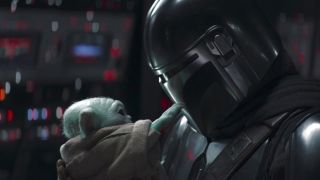Storytelling is crucial to getting through crisis – as the pandemic has shown us
Shows like The Mandalorian, WandaVision and Tiger King have helped bring us through a crisis

The last year has been more than a bit strange. The vast majority of us have been trapped in our homes while a horrible, terrifying virus spreads. However, one of our refuges – something we have all relied upon during the pandemic – has been the television. Whether watching movies, TV shows, or playing video games, we have all found sanctuary within on-screen entertainment.
In particular, streaming services have come on leaps and bounds. We have seen the launch of HBO Max, Peacock, and even Quibi (RIP). With theatrical releases few and far between, event cinema has moved to the small screen, with Soul and Wonder Woman 1984 being available from the comfort of our living rooms on release day. These events have unified us and shown the sheer power and importance of storytelling in a time of crisis.
The first show to pique our collective interest was Tiger King, a Netflix documentary that chronicles the story of Joe Exotic, his big cat obsession, and an alleged murder plot against animal rights advocate Carole Baskin. The series premiered at just the right time to capture our attention, releasing on March 20, 2020, as lockdowns around the world were coming into effect. Though things were getting scarier, we had this stranger-than-fiction story to keep our minds occupied, to the point where, if you had not watched all eight episodes, you were seriously missing out – and were probably growing more and more annoyed at how Zoom chats were filled with Exotic-related conspiracy theories. (Funnily enough, Louis Theroux released his own Tiger King follow-up in April 2021, and Twitter users were quick to point out how lockdowns were starting and ending with Tiger King.)

Following a summer of mixed messaging about theaters, shops, and restaurants reopening, a few dark and cold months. Filling the vacuum left behind by Joe Exotic came The Mandalorian, the Star Wars show's weekly release schedule meaning we could post theories online, share Baby Yoda GIFs with our friends, and engage with egg discourse. When Luke Skywalker appeared, the world erupted in a chorus of whoops, and we were sent off into the holiday period with our heart strings thoroughly pulled by Grogu and Din Djarin's emotional goodbye.
Christmas brought the diverting delights of Bridgerton, which quickly became Netflix's most popular series of all time, and Wonder Woman 1984 arrived on HBO Max, giving superhero fans their first major hit since Birds of Prey, released back in February (which is not to disregard The Boys season 2, but that was a different beast to the usual Marvel and DC fare). Wonder Woman was only a taste: while the world was gripped by the pandemic, filmmakers had been hard at work producing more content for us to enjoy and, after a few delays, Marvel's Disney Plus rollout began in earnest with WandaVision.

The series infamously set off a blaze of theorizing, to the point that the show's creatives tried to walk back the hype – director Matt Shakman assured fans the aerospace engineer was not a big deal (he wasn't lying), while Paul Bettany admitted the much-discussed cameo he had been excitedly teasing was none other than… Paul Bettany. Theorizing about the MCU comes with the territory, yet, due to a huge break since the last Marvel releases – 2019's Avengers: Endgame and Spider-Man: Far From Home – and many of us remaining indoors, WandaVision captured the cultural zeitgeist: there were few people stuck at home not pondering the mysteries of Westview.

COVID cinematic universe: Are we ready to see the pandemic on screen yet?
WandaVision also became a very meta reflection of the power of storytelling in crisis. Sitcoms are Scarlet Witch's escape mechanism, with the show's eighth episode showing the hero diving into cheery stories like Malcolm in the Middle when she's struggling to cope. In fact, the show sees Wanda manifest her own set of sitcoms to live out her ideal life with Vision, literally creating conflict-free narratives in the sitcom form. Like us, Wanda dealt with her trauma by submerging herself in fictional worlds. And when Vision asked the now-immortal words "What is grief, if not love persevering?" many fans used social media to share the effect that line had on them, and how it articulated their experiences with loss in the pandemic.
Sign up to the GamesRadar+ Newsletter
Weekly digests, tales from the communities you love, and more
Storytelling has been important across history, so it's no surprise that, in a time of global crisis, we turned to fictional worlds to keep us going. Whether you're now getting ready for a new episode of Loki every Friday, catching up with the vintage enchantments of WandaVision, cheering on the MCU's new Captain America in The Falcon and the Winter Soldier finale, doing a Bridgerton binge-watch, a Schitt's Creek marathon, making your way through the Oscar-winning movies, or you bought a chessboard after The Queen's Gambit, these stories have brought us glorious escapism when we've needed it. As theaters slowly begin to reopen, we'll finally get to see No Time to Die and Fast and Furious 9, which will ease us back into normality – but it's difficult to imagine the likes of WandaVision and The Mandalorian not having a special place in our hearts when the pandemic is finally behind us.

I'm an Entertainment Writer here at GamesRadar+, covering all things film and TV for the site's Total Film and SFX sections. I previously worked on the Disney magazines team at Immediate Media, and also wrote on the CBeebies, MEGA!, and Star Wars Galaxy titles after graduating with a BA in English.
Most Popular

